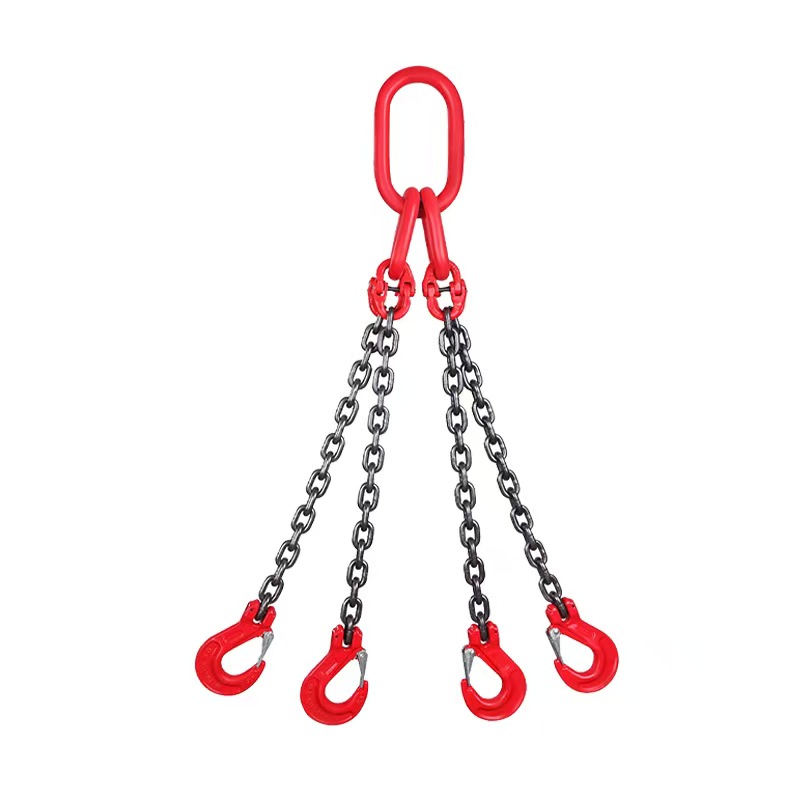Our staff will contact you within 12 hours, You can also contact us through the following ways:
Contact US WhatsApp: +86 18263873187
- Email: [email protected]
- Tel: +86 18263873187
- Web: www.lifting-chain.com
A 4 leg chain sling—also known as a 4 chain sling—is a versatile lifting tool widely used in construction, shipping, and heavy industry. With four alloy steel legs connected to a master link, it ensures stability when lifting irregular or bulky loads. From standard capacities to specific configurations like 4 leg chains 6.7 t, buyers need to understand working load limits (WLL), safety factors, and pricing trends before making a choice. This article explains the features, applications, and typical 4 leg chain sling price ranges to help you select the right sling for your lifting operations.
A 4 leg chain sling consists of four chains attached to a single master link at the top and usually fitted with hooks or other lifting accessories at the ends. Compared to 1-leg, 2-leg, or 3-leg slings, the four-leg design distributes the load across more contact points, providing enhanced balance and stability. This makes it suitable for complex or uneven lifting tasks.
Key features include:
Made of quenched and tempered Grade 80 (G80) or Grade 100 (G100) alloy steel
Certified to meet standards like EN 818, ASTM, or NACM
Resistant to wear, high temperatures, and heavy-duty use

The safe working load (WLL) of 4 leg chains depends on:
Chain diameter (e.g., 8 mm, 10 mm, 13 mm, 16 mm)
Material grade (G80 vs. G100)
Sling angle (the angle between legs significantly affects WLL)
A common configuration such as 4 leg chains 6.7 t refers to a sling with a rated WLL of 6.7 tonnes at a specific chain diameter and angle.
Typical applications include:
Lifting steel plates, pipes, or beams
Handling shipping containers
Moving large machinery and prefabricated structures
Construction and marine operations
The 4 leg chain sling price varies based on several factors:
Chain grade: G100 slings are stronger and usually more expensive than G80
Chain diameter & length: Heavier chains with longer legs increase cost
End fittings: Hooks, self-locking hooks, or foundry hooks affect pricing
Certifications: CE, TÜV, ISO9001 approvals may raise the price but ensure quality
Price trend:
Smaller diameter G80 models: economical and widely used
Heavy-duty G100 slings: higher price but better strength-to-weight ratio
Chain Diameter (mm) | Grade | WLL @ 60° (tonnes) | Typical Use | Notes |
8 mm | G80 | 3.6 t | Light machinery | Affordable option |
10 mm | G80 | 5.0 t | Steel plates, beams | Balanced strength |
13 mm | G80 | 7.0 t | Containers, machinery | Often equals 4 leg chains 6.7 t |
16 mm | G100 | 11.2 t | Heavy prefabricated units | Higher cost, higher safety |
Using a 4 chain sling requires strict safety checks:
Always inspect for wear, deformation, or cracks before use
Avoid sharp edges without protection (use corner protectors)
Never exceed rated WLL
Store slings in dry conditions to prevent corrosion
Regular inspection ensures longevity and compliance with industry standards.
The 4 leg chain sling offers unmatched lifting stability and is a must-have for heavy industry and construction projects. Whether you need a standard 4 chain sling, a certified 4 leg chains 6.7 t, or you are comparing 4 leg chain sling price options, choosing quality ensures both safety and efficiency.
Contact TOPONE CHAIN for reliable 4 leg chains with CE/ISO certifications, competitive pricing, and fast global delivery.